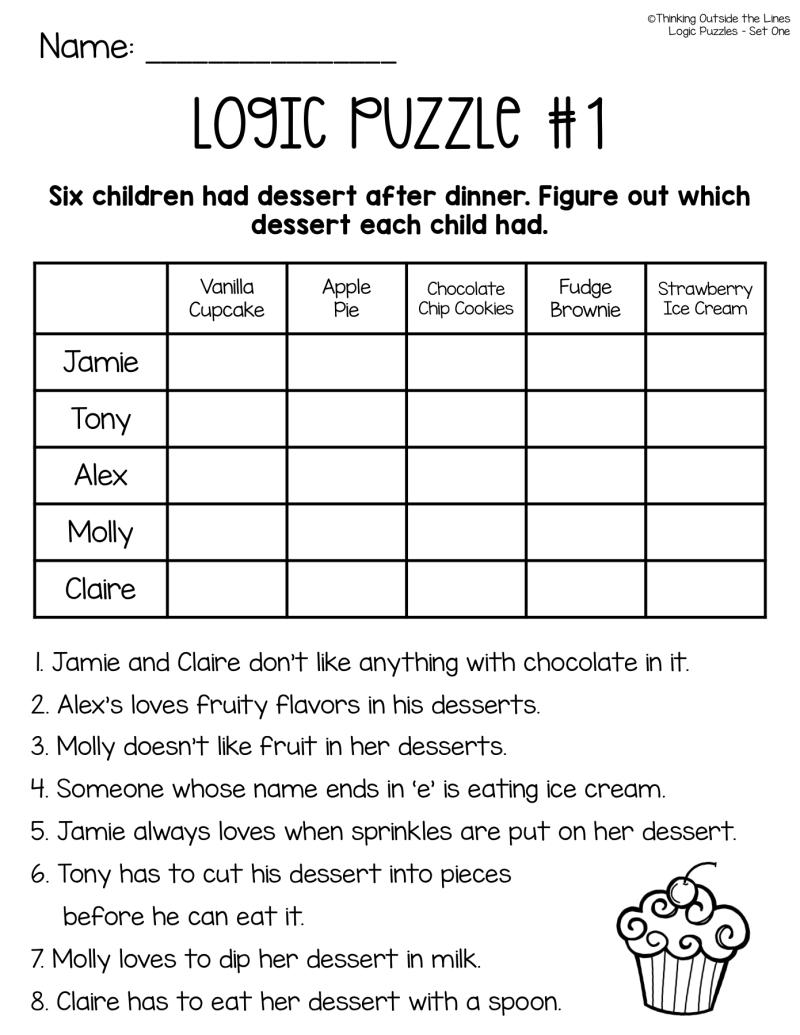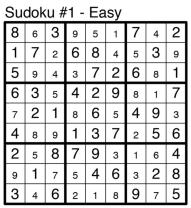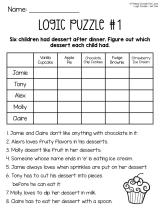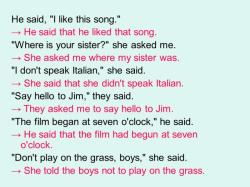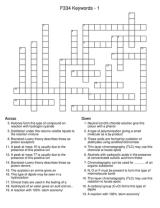What are different types of logic puzzles?
Logic puzzles come in various forms and are designed to challenge your problem-solving and deductive reasoning skills. Here are different types of logic puzzles that are popular and engaging:
Sudoku:
- Sudoku is a number-placement puzzle where you fill a 9x9 grid with digits so that each column, each row, and each of the nine 3x3 subgrids contain all of the digits from 1 to 9.
Crossword Puzzles:
- Crossword puzzles involve filling in words into a grid based on clues provided. Solving a crossword requires both word knowledge and logical deduction.
Logic Grid Puzzles:
- In logic grid puzzles, you're given a scenario with a set of clues, and you use deductive reasoning to fill in a grid with information about the relationships between different elements.
Kakuro:
- Kakuro is a number puzzle where you fill a grid with digits based on the sum of numbers in "cages" and the requirement that each digit 1-9 must appear once in each row and column.
Nonograms (Picross):
- Nonograms, also known as Picross or Griddlers, are picture logic puzzles where you fill in cells in a grid to create a picture based on numeric clues for each row and column.
KenKen:
- KenKen is a math puzzle that combines elements of Sudoku and arithmetic. The grid is divided into cages with a target number and operation, and you must fill in the numbers without repeating them in a row or column.
Cryptic Crosswords:
- Cryptic crosswords are a variation of traditional crosswords where the clues involve wordplay, anagrams, and cryptic messages, adding an extra layer of complexity.
Einstein's Riddle:
- Einstein's Riddle, also known as the Zebra Puzzle, is a logic puzzle that involves deducing the properties of five houses and their occupants based on a set of clues.
River Crossing Puzzles:
- River crossing puzzles challenge you to move characters or objects from one side of a river to the other using a boat, adhering to specific rules and constraints.
Tower of Hanoi:
- The Tower of Hanoi is a classic mathematical puzzle where you move a stack of discs from one rod to another, following specific rules, and aiming to transfer the entire stack to another rod.
Mastermind:
- Mastermind is a code-breaking game where one player sets a secret code, and the other player tries to guess the code using clues provided after each guess.
Hashiwokakero:
- Hashiwokakero, or Bridges, is a puzzle where you connect islands in a grid with bridges according to certain rules, ensuring that the number of bridges connected to each island matches the indicated value.
These puzzles cater to different preferences and skill levels, providing a wide range of mental challenges for enthusiasts of logical reasoning and problem-solving.
Unraveling the Mystery: A Journey into the World of Logic Puzzles
Logic puzzles, those intricate tapestries of clues and deductions, captivate minds and tickle intellects. But navigating this vast landscape requires a map. Let's embark on a journey to explore different types of logic puzzles, their benefits, and avenues to dive deeper:
1. Types of Logic Puzzles and their Characteristics:
- Deductive Reasoning Puzzles: These rely on logic and evidence to draw conclusions, like Sudoku and Cryptex. Each clue unravels a thread, ultimately leading to a satisfying "aha!" moment.
- Inductive Reasoning Puzzles: These involve observing patterns and relationships to discover a hidden rule or principle, like Kakuro and KenKen. They train the mind to think laterally and connect seemingly disparate dots.
- Spatial Reasoning Puzzles: These challenge your ability to visualize and manipulate objects in space, like Tangrams and Soma Cubes. They sharpen spatial awareness and enhance mental flexibility.
- Wordplay Puzzles: These rely on the manipulation of language and meaning, like crosswords and riddles. They hone vocabulary, lateral thinking, and the art of deciphering hidden meanings.
- Combinatorial Puzzles: These involve exploring all possible combinations of elements to reach a solution, like Rubik's Cube and Rubik's Magic. They demand strategic thinking and the ability to systematically explore possibilities.
2. Enhance Critical Thinking and Problem-Solving:
Logic puzzles are more than just mental pastimes; they are mini-gyms for your brain. By:
- Sharpening analytical skills: They train you to analyze information, identify patterns, and draw logical conclusions.
- Boosting problem-solving ability: They challenge you to approach problems systematically, break them down into smaller parts, and devise creative solutions.
- Improving concentration and focus: They demand sustained attention and mental discipline, enhancing your ability to filter out distractions and focus on the task at hand.
- Strengthening memory and recall: They often require remembering past clues and rules, stimulating memory function and cognitive flexibility.
3. Popular Logic Puzzle Formats:
- Sudoku: The king of number logic, Sudoku challenges you to fill a grid with numbers following specific placement rules.
- Crosswords: A wordplay labyrinth, crosswords demand vocabulary prowess and the ability to decipher cryptic clues.
- Riddle me this!: Playful and challenging, riddles tease the mind with wordplay and hidden meanings, testing creativity and lateral thinking.
- Escape rooms: These immersive experiences translate logic puzzles into real-world scenarios, encouraging teamwork and collaborative problem-solving.
4. Exploring and Enjoying Logic Puzzles:
- Start simple: Begin with easier puzzles to build confidence and gradually progress to more challenging ones.
- Variety is the spice of life: Explore different types of puzzles to keep your mind engaged and challenged.
- Make it a social activity: Share puzzles with friends and family, turning it into a bonding experience and brainstorming session.
- Go digital: Numerous websites and apps offer diverse logic puzzles with varying difficulty levels.
- Join the community: Online forums and social groups connect puzzle enthusiasts, providing a platform for sharing tips, challenges, and discussions.
5. Online Platforms and Resources:
- Logic Games Online: Offers a vast collection of classic and modern logic puzzles, categorized by difficulty and type.
- Sudoku.com: The ultimate Sudoku hub, featuring daily puzzles, tournaments, and variations like Killer Sudoku and Color Sudoku.
- Brainzilla: A treasure trove of logic puzzles across categories, including crosswords, riddles, brainteasers, and number puzzles.
- Puzzlenation: This website combines logic puzzles with educational learning, making it a fun and enriching experience for all ages.
- Your local library: Libraries often have dedicated sections for puzzle books and magazines, offering a wide variety of choices to explore.
So, dive into the world of logic puzzles. Embrace the challenge, savor the thrill of deduction, and let your mind dance with possibilities. Remember, the journey is just as rewarding as the solution, so enjoy the process and let your inner puzzle master shine!
